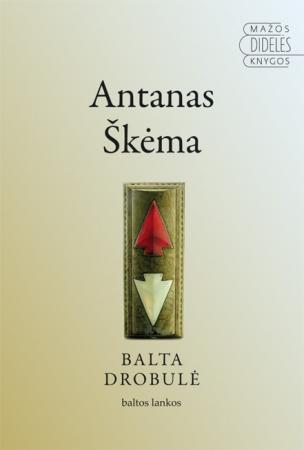
- The White Cloth
- Published by: Baltos Lankos (2013)
- Level: Advanced
- First Published in: 1958
In this modernist Lithuanian novel, a young poet survives World War II in Lithuania, enduring torture at the hands of the local Soviet law enforcement agency. He later finds himself in New York City, where he works as an elevator doorman and succumbs to panic attacks and gradual psychological collapse.
Antanas Škėma is an author Lithuanian readers either love or hate. He is one of the most prominent writers of Lithuanian modernism and is often a breath of fresh air for high school students, coming after novels and novels of Lithuanian realism, which typically have rural settings, describe harsh realities, and portray characters who are continuously dependent on their environments. Modernist novels, on the other hand, tend to reject these conventions, dwell on existential questions, and shift between first-person self-analysis and surreal elements. Balta Drobulė (The White Cloth), first published in 1958, was written during Škėma‘s exodus in Western Europe and the United States, where the author lived for more than a decade until his abrupt death in a car crash in 1961. The narrative of the novel is by no means less dramatic than the author’s life and is presented in an engaging two-fold format.
"Antanas Škėma is an author Lithuanian readers either love or hate."
Each chapter of the book, with the exception of the prologue and the epilogue, is divided into two separate sections, which the reader needs to slowly piece together to understand what happens in the life of the main character, Antanas Garšva. The first section, entitled “From the Notes of Antanas Garšva,” is his first-person account of life as a poet in Lithuania before and partly during World War II. Life for Antanas at home is not easy. As an artist, he is even tortured by the NKVD (a Soviet law enforcement agency that operated like a secret service) for not producing the kind of poetry that could serve the regime. Antanas’ mother slowly grows insane, while he runs away from all potentially meaningful romantic relationship he starts.

The second section tells the story of Antanas’ life in New York City, where he works as a doorman in an elevator. Antanas writes to escape the meaninglessness of the world he is forced to live in, the elevator space he so often compares to a prison, a cell, and which becomes a symbol of his pointless presence. His first-person account resembles more a stream of consciousness than structured diary entries. The fact that the character has a psychological disorder and endures panic attacks becomes more and more obvious as his illness progresses, and at the very end, readers are left with an interpretative task: to figure out whether Antanas committed suicide or went completely insane.
Death is an inescapable element of Antanas’ life and one of the major themes of this existentialist novel: “Bijau mirti, todėl geriu. Bijau mirti, todėl rašau. Bijau mirti, todėl ryju tabletes. Viskas vardan mirti” (I fear death, that’s why I drink. I fear death, that’s why I write. I fear death, that’s why I take pill after pill. All is in the name of death). Antanas writes about the mode of living he has chosen. Writing becomes his way out of his otherwise gloomy reality, and creativity and self-irony are his asylums in a world where he is forced to ride an elevator up and down each day.
Balta Drobulė was ahead of its time. Had it not been for Škėma’s sudden death, it might have been accompanied by more novels as engaging, thought-provoking, and rich with inner monologues."
Garšva frequently references authors like Sigmund Freud, Karl Jung, Franz Kafka, or Albert Camus, mixing these references with Lithuanian-American words and slang: “Bye. Ateik šeštadienį. Bus lobsteriai” (Bye. Come on Saturday. We’ll have lobsters). In order to – in a way – represent the deterioration of his mental state, Antanas uses the word “abyss” often in his writings: “Mano pasaulis dūžta. Noriu aprašyti slydimą į bedugnę” (My world is breaking apart. I want to document my sliding into the abyss). Hence, from cultural references, the author moves toward somewhat sentimental and hyperbolic expressions.
Interestingly, throughout the novel, the protagonist keeps on referring to himself as a chinchilla (a kind of South American rodent). This animal does not spark any particular associations in the Lithuanian language, yet in the novel it is used as an epithet for an oblivious life, one only concerned with work and survival. In the very last paragraphs, before Antanas dies or – depending on one’s interpretation – becomes insane, the chinchilla parallel appears again: “Garšva laiko popieriaus lakštą ir plėšo jį į siauras juostas. Jo veidas laimingas. Ramaus idioto. Jis uosto popierių. Jo veidas šinšilo” (Garšva is holding a piece of paper and is tearing it into small stripes. His face is happy. One of a calm idiot. He’s sniffing the paper. His face is a chinchilla face). Balta Drobulė was ahead of its time. Had it not been for Škėma’s sudden death, it might have been accompanied by more novels as engaging, thought-provoking, and rich with inner monologues.

Photo from the video "The Daughter Tells" (2012) by Oleg Lubske
